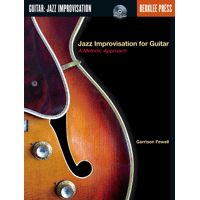Jazz Improvisation for Guitar: A Melodic Approach
by Garrison Fewell
available from Amazon.com
Improvise better solos by using triads and melodic extensions. Melodies based on triads and melodic extensions sound more natural and musical than ones developed exclusively from scales. Triads—the fundamental building blocks of harmony—are a simple and effective remedy for scale dependency in improvisation. Explore the potential of triads and their melodic extensions, and learn to connect them using guide tones. You'll learn to create solo phrases in the styles of some of the world's finest jazz guitarists—Wes Montgomery, George Benson, Grant Green, Kenny Burrell, and Pat Martino.
In Jazz Improvisation for Guitar: A Melodic Approach, world-renowned jazz guitarist Garrison Fewell offers an organized approach to creating expressive and melodic jazz solos and accompaniments. This book includes numerous triad and melodic extension examples and exercises to help you achieve the most expressive jazz feel and rhythm.
- Broaden your melodic palette using triads, melodic extensions, guide tones, and altered notes.
- Expand your agility on the fretboard, throughout the range of the guitar
- Learn the intervals that make up melodies
- Add articulation to your phrases by playing excerpts in the styles of the masters of jazz guitar
- Use guide tones to connect your melodic lines and play the changes
- Get the rhythmic skills essential to jazz phrasing
- Use guide tones to build voicings for comping
- Tablature included
Develop a more melodic way of thinking about harmony, and learn the improvisational tools that will help you create your own approach to soloing over chord changes.
The included play-along CD features outstanding musical examples and rhythm-section tracks performed by a top-flight triio: Garrison Fewell on guitar, Steve LaSpina on bass, and John Riley on drums. A special bonus track explores the techniques you've learned throughout the book
BUZZ
"Garrison Fewell has long been a hero to the jazz community. Read this book and you will find out why."
—Jim Hall, Acclaimed Jazz Guitarist, Composer, Arranger
"Garrison Fewell presents and demystifies many of the essential elements and techniques of jazz guitar, with useful and easily applied examples. He gets the player's hands, ears, and mind all involved. I wish this book had been around thirty years ago!"
—Howard Alden, Jazz Guitarist
"This book is a really well-thought-out guide to improvisation. I wish I'd had a book like this when I was a student."
—George Cables, Pianist/Composer
"G.F.'s book is a profound learning tool! I refer to Garrison as 'G.F.' here because of this very clear, but so simple approach to using a 'G' minor triad with its natural connection to 'F' major in an earlier chapter. From this point in the book, you can build on this same approach by following this rule in all other keys and end up with 'great ears' and a wealth of knowledge."
—Billy Harper, Jazz Saxophonist/Composer
"Garrison Fewell's concept of using guide tones and intervals in improvisation instead of 'running scales' is very important. Recommended for all who want to master 'inside' as well as 'outside' playing."
—John Tchicai, Author of Advice to Improvisers, Ed. Wilhelm Hansen
Also by Garrison Fewell
|



